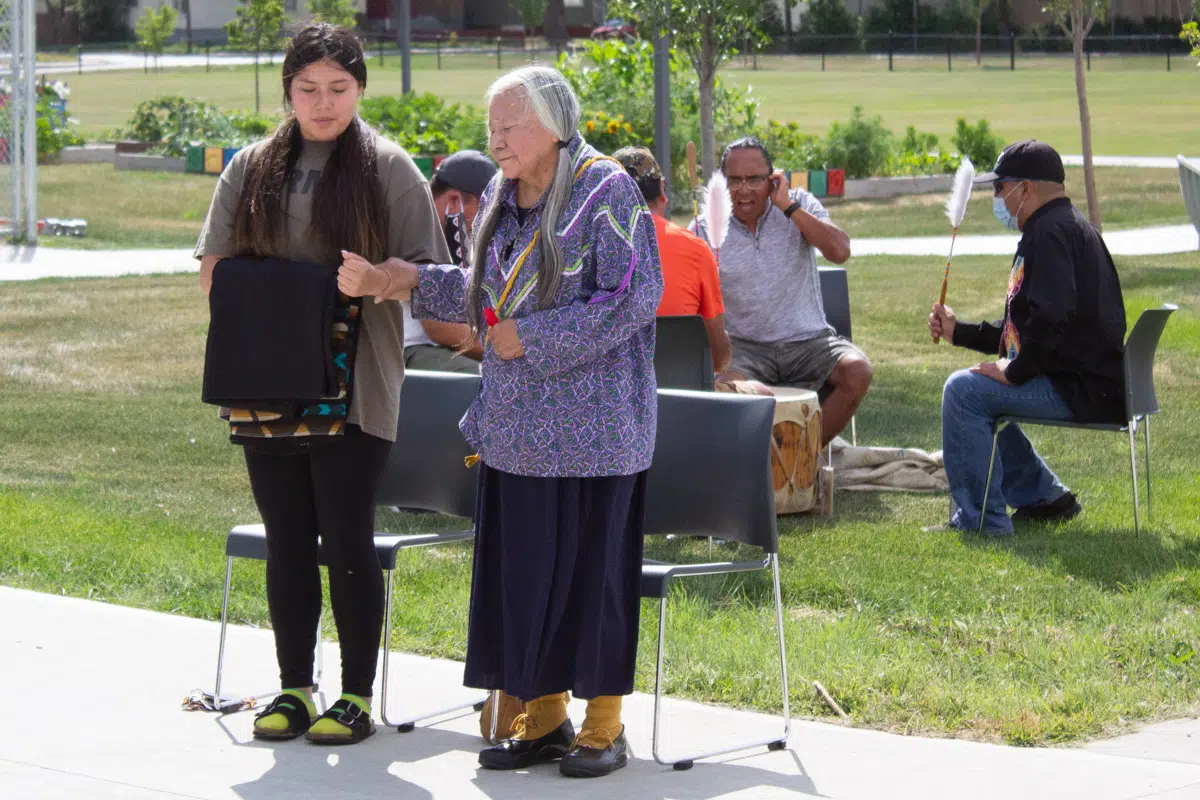It was a positive scene at the mâmawêyatitân centre on Wednesday morning as Reconciliation Regina publicly launched its 2020-21 Community Action Plan.
Drummers from the Lone Creek Singers laughed and chatted among themselves as speakers and attendees milled about, smiling and chatting.
A pan was passed around for attendees to have the chance to smudge before First Nation elder Lorna Standingready opened the ceremony with a prayer.

Regina Mayor Michael Fougere speaks at the public launch of Reconciliation Regina’s Community Action Plan on Aug. 12, 2020. (Libby Giesbrecht/980 CJME)
Regina Mayor Michael Fougere said the Community Action Plan released by Reconciliation Regina will give the city “meaningful purpose” and acts as a “road map for the future.”
The Reconciliation Regina group was started after the release of the Truth and Reconciliation Commission’s (TRC) 94 calls to action in June 2015. The organization began with the intent to actively work towards meeting the TRC’s calls to action in Regina.
More than 85 community organizations have now partnered to help develop a Regina-based response to these calls to action.
Fougere is one of several board members for Reconciliation Regina, which include the board’s chair, Gillis Lavalley, and Cowessess First Nation Chief Cadmus Delorme.
The plan was developed over the past three years in consultation with members of the public through dialogue, workshops, conversations with elders, surveys and the compilation of other data.
Fougere said the plan and Reconciliation Regina are focused on relationships, respect, opportunities and accountability.

The Lone Creek Singers perform at the mâmawêyatitân centre on Aug. 12, 2020. (Libby Giesbrecht/980 CJME)
The document sets out 18 calls to action under these four areas.
Calls for greater Indigenous representation in leadership, building relationships with Indigenous individuals, celebrating Indigenous events and preserving Indigenous history are some of the key areas of focus within the area of relationships.
To improve respect, the document talks about increasing awareness and support for Indigenous initiatives and demonstrating respect for Indigenous peoples, communities and organizations by embedding cultural protocols in “all aspects of our work.”
The Opportunities section highlights investigating opportunities to engage Indigenous leaders, while the final section focuses on ways to track and report progress made on these calls to action.
Each section outlines broad actions alongside deliverable objectives in working towards reconciliation in Regina.
Lavalley said the plan was created specifically for Regina with calls to action, not recommendations.
“People have to start being inclusive … for this to work,” he said.
“Today we can look at each other … we can feel our spirits intermingling,” Standingready said in her closing blessing.
The elder emphasized the importance of learning and said the calls to action in both the TRC and Reconciliation Regina’s Community Action Plan have made her “free.”
“I (have) learned to listen … not only with my ears but with my heart,” Standingready said. “We’re so blessed to be here.”











